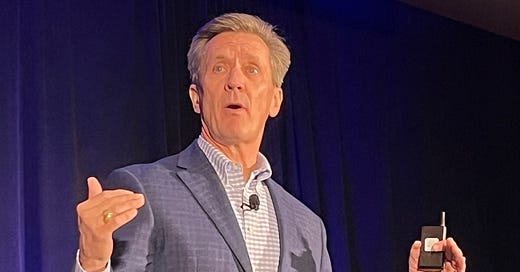When Following is Leading: Trust and Accountability in Public Service
Nine essentials for building a culture of integrity in local government. Spoiler alert: It starts with you
“Show me any great leader, and I’ll show you a great follower.” At first, this insight seems unexpected — aren’t leaders supposed to lead, after all? But as Steve Dye, Allen Police Chief and a seasoned public servant with nearly 40 years in law enforcement and city administration, explains, the best leaders are those who know how to follow first.
From his early days as a Houston patrol officer to senior administrative roles across Texas, Dye has built a career on trust, transparency, and accountability, values he believes every great leader must first model as a team member.
This month’s spotlight from the 2024 Servant Leadership Conference highlights Dye’s approach to building trust: exceeding expectations, over-communicating, and leading with integrity. (Full disclosure: I do occasional consulting for SGR, which conducts the conference. This series was my idea, and I receive no financial compensation for it from SGR.) At a time when government professionals face enormous pressures, his advice offers a roadmap to strengthen credibility, resilience, and a renewed culture of public service.
Dye opened his presentation by noting, “Following isn’t about chain of command or structure; it’s about how we treat each other, how we gain that trust. What can we do as employees to inspire others to trust us? What can we do to earn that trust from others?”
Here are the nine points he made that future leaders should take to heart.
Show Up. Be on time, be engaged, and be prepared. “This might seem like common sense, but you’d be surprised how often it doesn’t happen,” he said. “It takes thought, it takes discipline, and we have to create that template for others to follow.”
Exceed Performance Expectations. If you want others to trust you, meeting the basics of your job description isn’t enough. “Performance expectations are just that — the baseline. So let’s exceed those expectations; let’s do that extra bit.”
Be Timely, Responsive and Communicate Extensively. Younger employees need to let the boss know they got the email. Seriously. “I actually asked people I’ve worked with what I did to inspire their trust, and they mentioned my responsiveness. You can’t communicate too much. Be timely, responsive, and over-communicate. Never make your boss, a peer, or a subordinate guess what’s going on. And sometimes, that communication should be face-to-face rather than just by email.”
Build a Reputation of Dependability as a Trusted Team Member. “Be that dependable person who follows through. When a team member needs help, be there for them. We all need help sometimes. Be that person who lends a hand when someone next to you needs it.”
Lead by Example. Your work ethic, demeanor, and how you carry yourself matter. “But it’s also the intangibles. We all have bad days, but if someone walks by your desk, cubicle, or office and you say hello half the time and ignore them the other half, that’s not leading by example. For those of you supervising others, how you treat them is how they’re going to treat others, including the public we serve. Lead by example, even when you’re tired or it’s the end of the week.”
Exhibit Energy and Passion. “Bring your A-game if you want others to bring theirs. Don’t just process the work. Organizations are never static; they’re always on the incline or decline. Great organizations innovate, they progress, and they create a culture where everyone wants to be a part of it.”
Be Positive. “Ask your employees what the most important thing is in their work environment. I guarantee ‘money’ is rarely the number one answer. Culture is critical.” Life often isn’t fair, he noted. “Don’t be a victim. Have a positive mental attitude.”
Keep reading with a 7-day free trial
Subscribe to Good Government Files to keep reading this post and get 7 days of free access to the full post archives.





